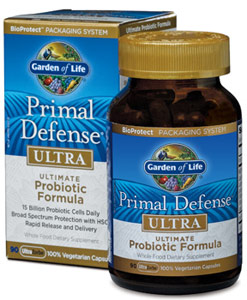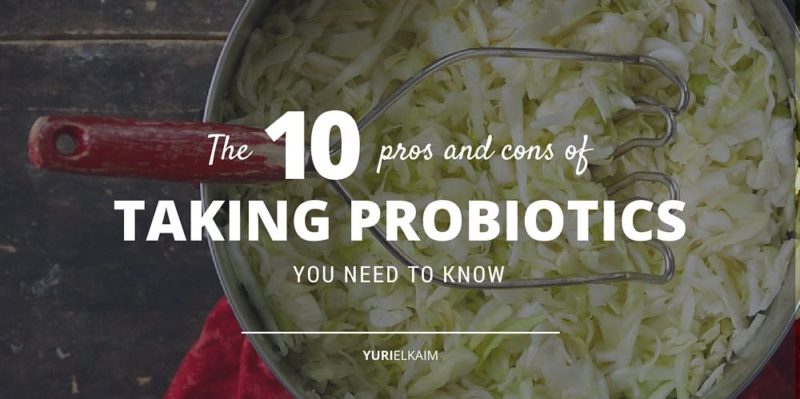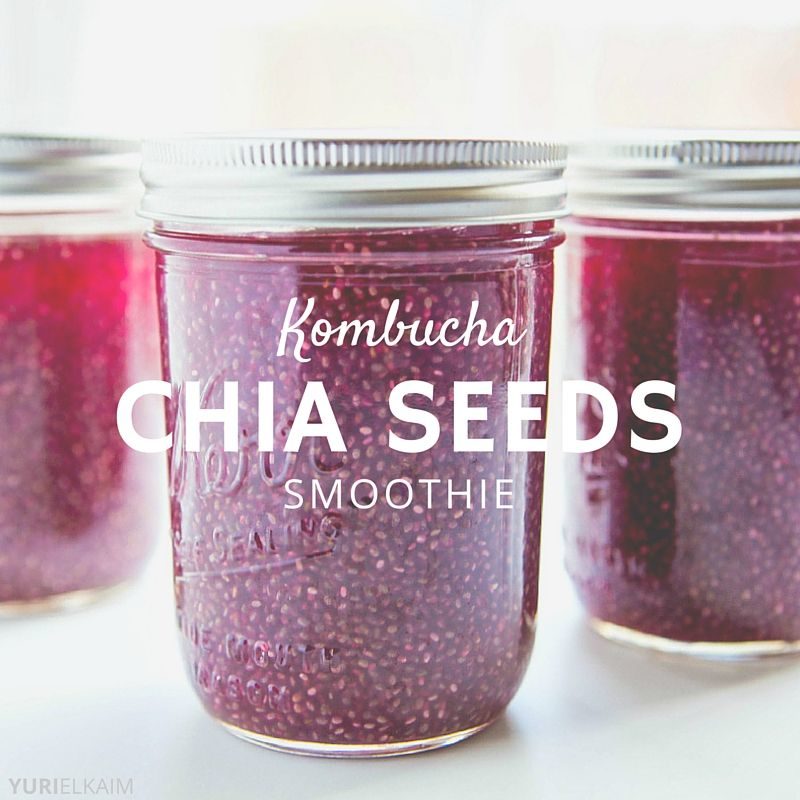In this article
It’s likely you’ve heard about the importance of probiotics to health, or at the very least, you’ve seen them do a happy cartoon dance in yogurt commercials.
Probiotics are different strains of bacteria that naturally exist in your digestive tract to keep your body in a state of optimal health.
When you hear the word “bacteria,” it doesn’t necessarily sound like something you’d want to have in your body.
However, probiotics are referred to as “friendly bacteria” because they work with – rather than against – the body. In fact, the word probiotic is Greek for “pro-life” or “promoting life.”
Pros and Cons of Taking Probiotics
We’ll get into the benefits of probiotics (as well as the side effects) in just a moment.
Probiotic cultures can be found in fermented foods and concentrated probiotic supplements. It’s important to include probiotics in our diet each day – along with other ultimate superfoods – since we’re regularly exposed to factors that can deplete our natural stores of good bacteria.
Chronic stress, antibiotic use, excessive sugar, alcohol consumption and environmental toxins all contribute to killing off friendly bacteria.
Now, we all have a natural balance of good and bad bacteria in our gut, as both varieties are required for health.
But one of the main benefits of probiotics is that they work hard to prevent bad bacteria from overpopulating our digestive systems.
When bad bacteria flourishes in the gastrointestinal tract, it creates the perfect environment for illness and disease to thrive.
Unfortunately, it’s quite common today for many people to experience symptoms and conditions that relate back to an overgrowth of bad bacteria – like Candida for example.
That being said, let’s take a look at the pros and cons of taking probiotics, and how they work to keep the body in a state of optimal health.
10 Big Pros of Taking Probiotics Daily
1. Improved Digestion and Elimination (Read: Quality Bowel Movements)
Brace yourself: We’re going to get into some real talk about poop here.
According to many natural health experts, you’re considered constipated if you’re not eliminating at least twice a day. In fact, three bowel movements per day is the ideal goal for optimal health.
Today, many people report bowel movements only a few times each week.
If you’re not eliminating regularly, toxins can accumulate in your digestive tract and allow the bad bacteria to have free reign in your gut.
In addition to frequency, the consistency of bowel movements is also important.
A “quality” bowel movement should have the same size and shape as a big brown banana. When BMs have this appearance, it’s a sign that a sufficient amount of good bacteria is present in your gut.
Bowel movements also shouldn’t be difficult or painful to pass.
Since probiotics help keep bowel movements regular, they are a must-have nutrient for those who experience constipation.
2. Gentle Detoxification
Elimination through bowel movements is one of the ways we naturally detoxify, and probiotics help the body efficiently eliminate waste and toxins from the digestive system.
Detoxing is often thought of as a restrictive process that comes in a boxed kit, complete with horrible tasting laxative herbs or strange tinctures.
However, taking a probiotic supplement each day, or eating probiotic foods, is a non-aggressive and simple form of daily detoxification.
3. Reduced Bloating
Bloating is a sign of sluggish digestion that in one way or another, can be traced back to an imbalance of friendly bacteria in your gut.
Since probiotics are responsible for helping your body digest the foods you eat (especially carbohydrates), frequent bloating after meals is a sign that you may need to increase the probiotics in your diet.
Studies have proven the efficiency of probiotics for reducing bloating and gas, which are both symptoms of irritable bowel syndrome, or IBS (1).
4. A Stronger Immune System
Approximately 70 percent to 80 percent of your immune system is located in your gut (2).
This is why a lack of friendly bacteria in your system can leave you more susceptible to frequent colds, flus, infections, and in some cases, serious illnesses.
That being said, one of the pros of taking probiotics is having fewer sick days, and being equipped with the necessary defense against exposure to the bacteria and germs that cause illness.
[Related: Nature’s Flu Shot and Cold Buster]
5. Natural Weight Loss
Have you ever noticed the natural weight loss that occurs when you eat a diet high in fiber from fruit and veggies?
One of the reasons this happens is because fiber contains prebiotics, which feed probiotics. And probiotics help move waste through the digestive system, which can otherwise be stored as excess weight.
This is why one of the side effects of taking probiotics is natural, effortless weight loss due to improved digestion.
[Related: How to Improve Your Digestion Power (8 Essential Steps)]
6. Increased Energy
If you’re eating for energy, you’ll definitely want to include probiotics in your diet.
Have you ever noticed the sluggish feeling that results from being bloated and constipated?
This is because a large portion of your energy is used for digestion.
When a sufficient amount of probiotics are present in your gut, your body can digest the food you’re eating much easier, and therefore requires less energy to do so.
When your natural energy is conserved, it can be used for other activities in your day. Eating for energy is all about improving the your body’s functions naturally, so that more energy is being conserved.
7. Healthier Skin
Clear, glowing skin is a telling sign of a healthy digestive system full of good bacteria.
Healthy skin is an inside job, which means it doesn’t come from a bottle of face cleanser or moisturizer.
Since your skin is a primary organ of elimination, toxins that naturally accumulate in your gut can end up being eliminated through the pores of your skin if your liver becomes overwhelmed, or if you’re not going to the bathroom every day.
By supporting your entire digestive process with probiotics, you can help prevent toxins from being eliminated through the skin.
[Related: How to Achieve Flawless Skin? Start with These 3 Super Nutrients]
8. Healthier Teeth
The benefits of taking probiotics also include improved dental hygiene. If you struggle with bad breath, or have cavities each time you visit the dentist, probiotics may be a nutrient that’s missing in your diet.
A specific strain of probiotics called lactobacillus reuteri showed defense against a strain of bad bacteria, called Streptococcus mutans, which is found in the mouth and can cause tooth decay and gingivitis (3).
9. Reduced UTI or Yeast Infections
This benefit of probiotics is for the ladies.
Like the gut, the reproductive system also contains a balance of good and bad bacteria. The bad bacteria can also overpopulate the vagina based on several dietary and lifestyle factors, as well as taking the birth control pill.
If you regularly encounter UTIs or yeast infections, taking probiotics can help rebalance the microflora and reduce the occurrence of bacterial infections.
According to Harvard Medical School, the probiotic strain Lactobacilli is particularly beneficial for restoring the friendly bacteria in the vagina (4).
10. Reduced Allergies
Whether you’ve had allergies for some time, or developed them recently, your gut bacteria may be compromised, which can lead to a condition called “leaky gut.”
Leaky gut is a condition that occurs when intestinal permeability is increased, which allows food particles to enter the bloodstream.
Since food particles aren’t supposed to be in the bloodstream, the body sees them as foreign invaders, and elicits an immune response to attack the food particle in the blood. These food particles are then recognized as allergens next time they enter the body.
One of the pros of taking a probiotic supplement is that it helps strengthen and heal the gut lining, which then prevents food particles from entering the bloodstream.
It’s not uncommon for allergies or food sensitivities to completely disappear once friendly gut bacteria has been replenished and restored.
How to Take Probiotics
Probiotics are found in unpasteurized fermented foods such as kimchi, kombucha, sauerkraut, kefir, tempeh, miso and yogurt.
I personally recommend avoiding dairy- and soy-based sources of probiotics if possible.
While some probiotics are better than none, dairy is acidifying to the body, and soy contains phytoestrogens that can contribute to hormone imbalance. Soy is also harder for the digestive system to digest and absorb.
Furthermore, commercially prepared yogurt is marketed as a food source rich in probiotics, when it’s often made from non-organic milk that contains high levels of hormones and antibiotics.
The probiotic strains found in dairy yogurt are also man-made, rather than formulated from naturally occurring strains of bacteria.
Additionally, anywhere from 12 to 30 grams of added refined sugar are found in flavored yogurt, which only negates the beneficial effects of probiotics. Instead of milk kefir or dairy yogurt, try getting probiotics from coconut milk kefir and coconut milk yogurt instead.
Here are a few recipes to try:
- Kombucha Chia Seeds Smoothie
- Kefir Smoothie Aka the Gut Healer
- The Healthy Gut Smoothie (Carrot Cake)
For a highly concentrated source of probiotics (which can be more therapeutic for those with symptoms of imbalanced gut bacteria), you may want to take a high-quality probiotic supplement.
Not only can you absorb billions of cultures from a probiotic supplement at once, several good bacteria strains are also included in probiotic supplements, unlike fermented foods. A variety of friendly bacteria is key for optimal gut health.
Side Effects of Taking Probiotics
At present time, probiotics aren’t known to have any health risks for any age group. Based on findings in studies so far, research suggests that taking a probiotic supplement each day isn’t likely to cause any harm.
The best time to take probiotics is first thing in the morning, on an empty stomach. This way, their digestion and absorption in the GI tract isn’t interfered with by other nutrients.
Probiotics are especially important to include in your diet if you’re taking a course of antibiotics. While antibiotics kill off bad bacteria, they also kill your good bacteria in the process.
You can usually take probiotics at the same time as antibiotics, and it’s recommended to continue taking a probiotic supplement for at least a few weeks after the course of medication is finished.
Just be sure to take the probiotics at least 2 hours apart from the antibiotics so they have a better chance of being absorbed (5).
Are There Negative Side Effects of Taking Probiotics?
The health benefits of probiotics are endless, but there are also cons to taking probiotics.

When choosing a probiotic supplement, it’s imperative to ensure it’s of high quality.
A probiotic supplement should be enteric coated (which means it can travel through the digestive tract without being killed off by stomach acid), and contains a variety of bacteria strains, not just one.
High-quality probiotic supplements will also come with a product guarantee. You can find probiotics at your local health food store in the refrigerated section.
In some cases, the initial addition of probiotics in your diet may produce digestive symptoms, such as constipation or more frequent bowel movements and/or increased gas, as your body adjusts to the increase of friendly bacteria.
However, the negative side effects of probiotics shouldn’t last longer than a few weeks.
If you ask me, probiotics are one of the most important nutrients to include in your diet each day when eating for energy, improving your digestive health and protecting yourself against illness and disease.




